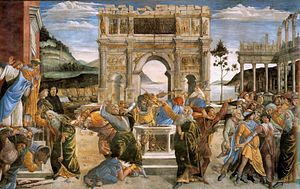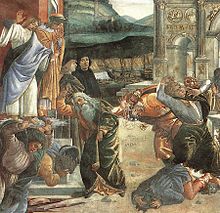Korach (biblical figure)


Korach ( Hebrew קֹרַח, Arabic قارون Qārūn ) was the leader of an uprising against Moses during the Exodus of the people of Israel ( Num 16.9 EU ).
Rotte Korach is the translation chosen by Luther for the followers of Korach ( Num 26,9 LUT ). The Hebrew word does not have a negative meaning like the German “Rotte” or the more common nowadays “Vereinrottung”. For the grammatical form of the expression that has become naturalized in German, see Status constructus .
Sons of Korach or Korachites denotes the descendants of Korach at the time of the temple . In the first book of the Chronicle (chapters 6, 9, 12 and 16) you are named as musicians and doorkeepers in the temple and as authors in some psalm headings.
Biblical narration
According to the biblical narrative, Korach from the tribe of the Levites rose together with Datan , Abiram and 250 other notable Israelites against Moses and his brother Aaron , because they were dissatisfied with the religious primacy of these two leaders. The rebels called for all Israelites to be equal before God and criticized the fact that Moses and Aaron allegedly placed themselves above the rest of the people.
Moses ended the revolt with divine support by calling for a divine judgment. Both the 250 discontented people and Aaron made incense offerings. A crack in the earth opened and swallowed Korach and his clan. Then fire from God ( YHWH ) went out and consumed the 250 insurgents.
It is not entirely clear from the text whether the sons of Korach were also killed ( Num 16.32 EU ) or not ( Num 26.11 EU ). In genealogies from the time of the temple, around 15 generations later, the name Korach appears again without reference to the uprising against Moses; the family tree ( 1 Chr 6,16-23 EU ) agrees so largely with that of Korach ( Ex 6,16-21 EU ) that the same person is certainly meant.
According to Ex 6.21 EU , Korach is the son of Jizhar, grandson of Kohat and great-grandson of the progenitor Levi . His brothers are called Nefeg and Sichri. After Ex 6.24 EU his sons Assir, are Elkanah and Abiasaph.
Korach is also mentioned in the New Testament . In Jude's letter it says about Gnostic false teachers that they fell into ruin with the rebellion of Korach ( Jud 11 EU ).
Other biblical persons named Korach
Only in genealogies, but without any other information, can one find:
- a son of Esau ( Gen 36: 14-18 EU , listed as grandson in v. 16), so not an Israelite
- an Israelite from the tribe of Judah ( 1 Chr 2.43 EU )
In genealogies, a "son" can also be a more distant descendant, as in 1 Chr 9.19 EU , where it is probably only about the belonging of the Schallum to the Korachites.
Korach in Islam
Korach is referred to as Qārūn in the Koran . Qārūn is mentioned in three places in the Koran (e.g. Sura 28 , Verses 76-81, Sura 40:23 ) and appears there as a member of the people of Moses and a minister of the Pharaoh. Qārūn believes that his wealth, which could hardly be sustained by a group of strong men, was only due to his knowledge. Because of his pride, the judgment comes over him and he sinks into the earth with his dwelling.
Web links
- Miriam von Nordheim-Diehl: Korach / Korachpsalmen. In: Michaela Bauks, Klaus Koenen, Stefan Alkier (eds.): The scientific Bibellexikon on the Internet (WiBiLex), Stuttgart 2006 ff., Accessed on May 29, 2012.
Individual evidence
- ↑ In the German dictionary , in section 3) of Lemmas Rotte , the increasingly negative connotation of “Rotte” (except in the technical context) has been pointed out since around the 16th century and Luther's use of “Rotte Korah” is cited as evidence. on-line